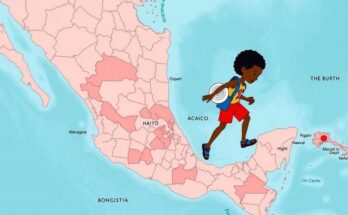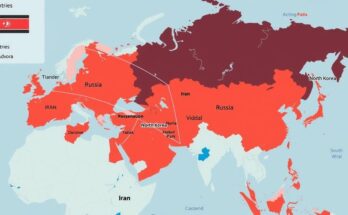This report details the urgent humanitarian efforts in Ukraine, Gaza, Syria, and regions impacted by Tropical Cyclone Dikeledi. Key issues include access to aid, displacement crises, and the need for international support and funding. UN officials stress the importance of cooperation from authorities to mitigate the ongoing humanitarian catastrophes in these areas.
Under-Secretary-General for Humanitarian Affairs, Tom Fletcher, is currently in Ukraine, engaging with those impacted by the conflict, discussing opportunities for UN cooperation with local authorities, and connecting with humanitarian partners. He visited Zaporizhzhia where a missile attack had recently destroyed a medical facility and met with displaced individuals in Dnipro. Fletcher commended local responders and organizations while observing the aid efforts at the front lines. He plans to extend his visit to Kharkiv where he will announce humanitarian assistance plans alongside UN Refugee Agency head, Filippo Grandi.
In the Occupied Palestinian Territory, the humanitarian crisis in Gaza continues to escalate. The UN’s Office for the Coordination of Humanitarian Affairs (OCHA) has reiterated the pressing need for Israel to allow humanitarian aid to reach Palestinians in Gaza, as ongoing hostilities exacerbate civilian suffering. OCHA reported inadequate cooperation from Israeli authorities, with only a small fraction of planned humanitarian movements being permitted, thereby jeopardizing the wellbeing of those displaced by conflict. Humanitarian Coordinator for the region, Muhannad Hadi, has called for protection of civilian locations and an end to hostilities as access to education remains severely hampered in the region.
In Syria, OCHA is actively supporting humanitarian responses amidst a challenging security landscape. Various organizations have made strides in providing medical vaccinations and addressing water shortages in vulnerable areas. However, volatility in regions like Aleppo has hindered operations, leaving over 400,000 individuals without reliable access to potable water. Disruptions to communication continue to affect many localities, limiting humanitarian outreach.
In southern Africa, Tropical Cyclone Dikeledi has had devastating effects, primarily in Madagascar and Mozambique. Emergency efforts are underway as authorities assess damage; more than 350 individuals have been displaced, and the cyclone has compromised essential infrastructure. Humanitarian partners are collaborating to ensure the provision of vital supplies and assess ongoing needs in the aftermath of the cyclone, particularly for communities already reeling from prior cyclones.
Efforts are ongoing to provide assistance to those affected, but the need for funding remains critical to address the rising humanitarian challenges brought about by these multiple crises.
This article highlights the current humanitarian crises in Ukraine, the Occupied Palestinian Territory, Syria, and Southern Africa due to Tropical Cyclone Dikeledi. Each region faces significant challenges, including conflict-related displacement in Ukraine and Gaza, continued hostilities in Syria, and natural disasters in Madagascar and Mozambique. The United Nations and various humanitarian organizations are undertaking efforts to respond to these crises, emphasizing the necessity for coordinated aid, security, and funding to alleviate the suffering of affected populations. The article depicts the ongoing efforts and demands for improved humanitarian access and assistance across these challenging environments.
In summary, the humanitarian landscape across several regions remains precarious due to armed conflicts and natural disasters. The UN and humanitarian agencies are diligently working to address immediate needs and mobilize aid, particularly in Ukraine, Gaza, Syria, and areas affected by Tropical Cyclone Dikeledi. However, the challenges of ensuring safe passage for aid and securing adequate funding persist. Effective coordination and advocacy for humanitarian access are critical to support populations in need.
Original Source: www.unocha.org




